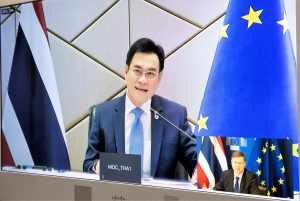Thailand and the European Union have agreed to restart negotiations on a bilateral free trade agreement that were frozen after the military took power in a coup in 2014.
In a statement yesterday, the European Commission said that senior officials from both nations will begin talks in Thailand later this year, to conclude an “ambitious, modern, and balanced free trade agreement” by 2025. Negotiations will cover trade in goods and services as well as investment in key Thai industries in which the EU is keen to increase its share, such as renewable energy, electric vehicles, and chip-making.
“This announcement confirms the key importance of the Indo-Pacific region for the EU trade agenda, paving the way for deeper trade ties with the second largest economy in South-East Asia and further strengthening the EU’s strategic engagement with this burgeoning region,” the Commission said.
The meeting reportedly followed a virtual meeting between EU trade chief Valdis Dombrovskis and Thai Commerce Minister Jurin Laksanawisit. The latter described the resumption of talks as a “historic day” for the two sides, Nikkei Asia reported, and said that they were aiming to conclude an agreement “within two years.” Politico quoted a European diplomat as saying that the negotiations are unlikely to begin before September.
The EU suspended most cooperation with Thailand, including trade agreement talks, in June 2014, a month after the military overthrew the elected government of Prime minister Yingluck Shinawatra. At the time, the bloc expressed its “extreme concern” at developments in Thailand and stated that the military should restore “as a matter of urgency, the legitimate democratic process and the constitution, through credible and inclusive elections.”
In October 2019, it decided to re-engage with the quasi-civilian government, still led by coup leader Prayut Chan-o-cha, that was formed after the elections that March. This culminated in the signing of a long-awaited Partnership and Cooperation Agreement in December of last year.
If signed, the Thailand-EU pact would be the European bloc’s third bilateral free trade agreement in Southeast Asia after the agreements signed with Singapore in 2013 and Vietnam in 2020. Both reflect Brussels’ desire to bolster its engagement with the “Indo-Pacific” in general and Southeast Asia in particular, partly to diversify its economic engagements beyond China.
According to the Commission, the EU is currently Thailand’s fourth-largest trade partner, while Thailand is the EU’s fourth most important trading partner in Southeast Asia. Two-way trade in goods amounted to $44.5 billion in 2022, while trade in services totaled a further $8.4 billion in 2020. In terms of investment, the Commission stated, the EU is the second-largest destination for outbound capital from Thailand, accounting for 14 percent of foreign direct investment (FDI) from Thailand. The EU, on the other hand, comprises a tenth of the FDI to Thailand. An agreement would likely raise the two nations’ mid-table economic partnership to region-leading status.
At the same time, the EU position reflects tension between its goal of leveraging its economic weight to bring about progressive change, and its strategic interest in bolstering relations with a strategically important, but politically illiberal, region. In 2020, in the context of the EU-Singapore Free Trade Agreement, two scholars have identified “tensions in EU external relations between hard commercial interests, on the one hand, and its foundation norms expressed in what we term values-based policies or interests, including human rights, on the other hand.”
The EU’s recent rapprochement with Thailand bears this out well. While the 2019 election ended a period of military dictatorship, giving Brussels an opening to restart cooperation, it in many ways simply reconstituted military rule behind a civilian façade. Given the military’s current power and the frequency of military interventions in Thai politics since 1932, it is also likely that its influence will persist for the foreseeable future, to the detriment of Thai democracy. As such, any EU agreement with Thailand will have to find a way to accommodate this reality, either by abandoning human rights conditionalities or watering them down to such an extent that they can easily be circumvented. And this is to say nothing about the human rights trade-offs involved in the negotiations of the free trade agreement with one-party Vietnam.
As China becomes a more pressing concern for European leaders, it is evident that the balance between values and interests is tilting ever more toward the latter.































